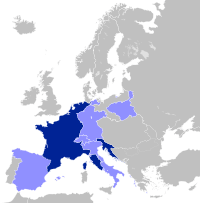Anconine Republic
| Anconine Republic | ||||||||||
| Repubblica Anconitana | ||||||||||
| ||||||||||
|
| ||||||||||
 Map of Ancona within modern Italy | ||||||||||
| Capital | Ancona | |||||||||
| Languages | Italian | |||||||||
| Religion | Roman Catholicism | |||||||||
| Government | Republic | |||||||||
| Consul | Pietro Reppi[1] | |||||||||
| Historical era | French Revolutionary Wars | |||||||||
| • | Proclaimed | 17 November 1797 | ||||||||
| • | Disestablished | 7 March 1798 | ||||||||
| ||||||||||
The Anconine Republic (Italian: Repubblica Anconitana) was a revolutionary municipality formed on 19 November 1797. It came about after a French victory at Ancona in February 1797, and the consequent occupation of the city.[2] It existed in the region of Marche, with Ancona serving as its capital. Despite the Treaty of Campo Formio stating that Ancona and the surrounding region had to be returned to the Papal States, the municipality proclaimed the decadence of papal rule, under French protection. The subsequent tension led to general conflict with the Pope and the French occupation of the whole of the Papal States. Ancona was incorporated into the Roman Republic on 7 March 1798. It had a consul as its head.
Ancona is now a province of Italy, in the central part of the country on the Adriatic Sea.
Sources
- ↑ Cahoon, Ben. "Anconine Republic". worldstatesmen.org. Retrieved 29 March 2015.
- ↑ Philip's Atlas of World History

